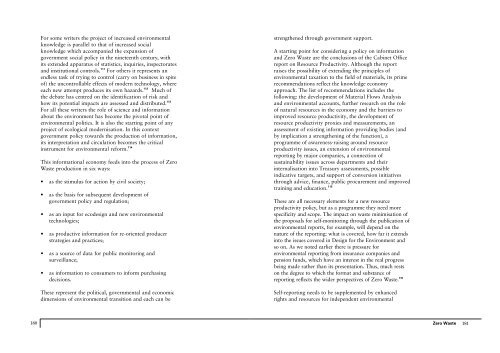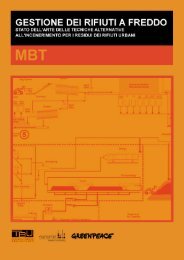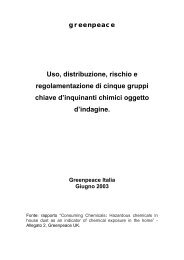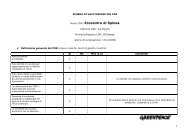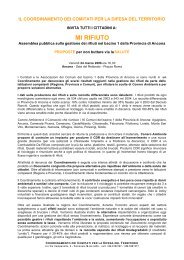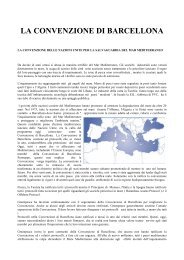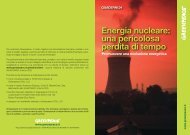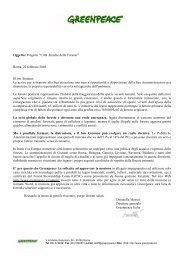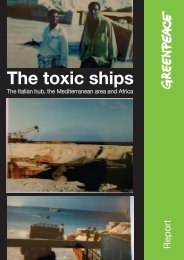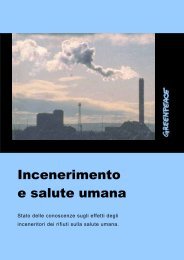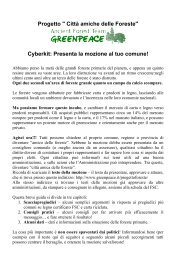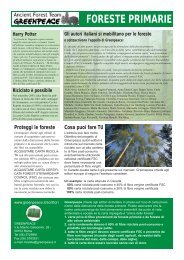Zero Waste by Robin Murray, Greenpeace Environmental Trust 2002
Zero Waste by Robin Murray, Greenpeace Environmental Trust 2002
Zero Waste by Robin Murray, Greenpeace Environmental Trust 2002
Create successful ePaper yourself
Turn your PDF publications into a flip-book with our unique Google optimized e-Paper software.
For some writers the project of increased environmental<br />
knowledge is parallel to that of increased social<br />
knowledge which accompanied the expansion of<br />
government social policy in the nineteenth century, with<br />
its extended apparatus of statistics, inquiries, inspectorates<br />
and institutional controls. 111 For others it represents an<br />
endless task of trying to control (carry on business in spite<br />
of) the uncontrollable effects of modern technology, where<br />
each new attempt produces its own hazards. 112<br />
Much of<br />
the debate has centred on the identification of risk and<br />
how its potential impacts are assessed and distributed. 113<br />
For all these writers the role of science and information<br />
about the environment has become the pivotal point of<br />
environmental politics. It is also the starting point of any<br />
project of ecological modernisation. In this context<br />
government policy towards the production of information,<br />
its interpretation and circulation becomes the critical<br />
instrument for environmental reform. 114<br />
This informational economy feeds into the process of <strong>Zero</strong><br />
<strong>Waste</strong> production in six ways:<br />
• as the stimulus for action <strong>by</strong> civil society;<br />
• as the basis for subsequent development of<br />
government policy and regulation;<br />
• as an input for ecodesign and new environmental<br />
technologies;<br />
• as productive information for re-oriented producer<br />
strategies and practices;<br />
• as a source of data for public monitoring and<br />
surveillance;<br />
• as information to consumers to inform purchasing<br />
decisions.<br />
These represent the political, governmental and economic<br />
dimensions of environmental transition and each can be<br />
strengthened through government support.<br />
A starting point for considering a policy on information<br />
and <strong>Zero</strong> <strong>Waste</strong> are the conclusions of the Cabinet Office<br />
report on Resource Productivity. Although the report<br />
raises the possibility of extending the principles of<br />
environmental taxation to the field of materials, its prime<br />
recommendations reflect the knowledge economy<br />
approach. The list of recommendations includes the<br />
following: the development of Material Flows Analysis<br />
and environmental accounts, further research on the role<br />
of natural resources in the economy and the barriers to<br />
improved resource productivity, the development of<br />
resource productivity proxies and measurements, an<br />
assessment of existing information providing bodies (and<br />
<strong>by</strong> implication a strengthening of the function), a<br />
programme of awareness-raising around resource<br />
productivity issues, an extension of environmental<br />
reporting <strong>by</strong> major companies, a connection of<br />
sustainability issues across departments and their<br />
internalisation into Treasury assessments, possible<br />
indicative targets, and support of conversion initiatives<br />
through advice, finance, public procurement and improved<br />
training and education. 115<br />
These are all necessary elements for a new re s o u rc e<br />
p roductivity policy, but as a programme they need more<br />
specificity and scope. The impact on waste minimisation of<br />
the proposals for self-monitoring through the publication of<br />
e n v i ronmental re p o rts, for example, will depend on the<br />
n a t u re of the re p o rting: what is covered, how far it extends<br />
into the issues covered in Design for the Environment and<br />
so on. As we noted earlier there is pre s s u re for<br />
e n v i ronmental re p o rting from insurance companies and<br />
pension funds, which have an interest in the real pro g re s s<br />
being made rather than its presentation. Thus, much re s t s<br />
on the degree to which the format and substance of<br />
re p o rting reflects the wider perspectives of <strong>Zero</strong> Wa s t e . 116<br />
Self-reporting needs to be supplemented <strong>by</strong> enhanced<br />
rights and resources for independent environmental<br />
180<br />
<strong>Zero</strong> <strong>Waste</strong><br />
181


